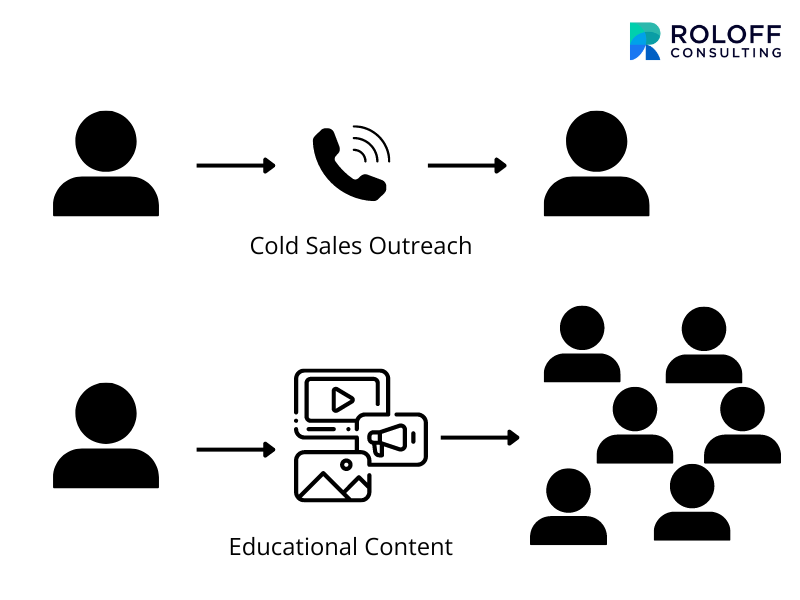The Best Salespeople are Teachers

The landscape of sales is shifting.
Traditional methods, once reliant on persuasion and charisma, are facing growing skepticism and dwindling trust.
According to Hubspot Research, only a mere 3% of people trust salespeople (better than 1% of politicians!).
This erosion of trust, coupled with the limitations of one-to-one interactions, has necessitated a reevaluation of the sales approach.
Enter the digital transformation of sales—a phenomenon reshaping the way we think about selling.
In this era, the best salespeople are not just sellers; they are teachers. They recognize that the key to success lies not in pushing products or services onto reluctant buyers but in providing valuable insights and knowledge.
In this Sell with Social, we'll delve into the evolution of salespeople as teachers and explore the myriad benefits of this paradigm shift. From building trust and providing additional value to cultivating long-term relationships and scaling through digital content.
The Problem with Traditional Sales
In the traditional realm of sales, trust is often elusive.
Consumers are bombarded with sales pitches, promotional emails, and cold calls, leaving them wary and skeptical of salespeople's intentions. This skepticism is reflected in the startling statistic that only 3% of people trust salespeople.
One of the fundamental issues with traditional sales lies in its reliance on one-to-one interactions. While these interactions can be valuable for building rapport and understanding customer needs, they are inherently limited in scale.
Salespeople are constrained by the finite hours in a day, making it challenging to reach a broader audience and maximize their impact.
And beyond simple resource constraints, the traditional sales approach can sometimes come across as pushy or aggressive, further eroding trust and alienating potential customers. Cold calling and incessant follow-ups may yield short-term gains, but they often result in long-term damage to the seller's reputation and brand perception.
As technology continues to evolve and empower consumers with more information and choices, salespeople must rethink their approach and embrace new strategies that prioritize trust, value, and relationship-building over transactional exchanges.
The Rise of Salespeople as Teachers
In response to the shift in our selling environment, the best salespeople are becoming teachers.
Rather than focusing solely on closing deals, they are leveraging their expertise to educate and empower their audience.
This shift is fueled by the digital transformation of sales. With the proliferation of online platforms, social media, and content creation tools, salespeople now have unprecedented opportunities to share knowledge and insights with a global audience. By embracing digital channels, they can reach thousands, if not millions, of potential customers with their message.

By positioning themselves as educators rather than salespeople, professionals can build credibility and establish themselves as trusted advisors in their respective industries.
The role of a teacher allows sales professionals to provide value beyond their products or services.
By sharing valuable insights, tips, and best practices, they can help customers solve problems, achieve their goals, and make informed decisions. In doing so, they become invaluable resources to their audience, fostering long-term relationships built on mutual trust and respect.
This rise of salespeople as teachers represents a fundamental shift in the way we think about sales.
It's no longer just about closing deals; it's about adding value, building trust, and empowering customers to succeed.
5 Benefits of Teaching To Sell
Let’s breakdown some tangible benefits that come with being a teacher to your prospective audience, along with examples of for reach.
- Building Authority as a Trusted Expert: Teaching positions sales professionals as experts in their field, earning the trust and respect of their audience. By consistently providing valuable insights and knowledge, they establish themselves as trusted advisors rather than mere salespeople.
Example: A software sales representative creates a series of instructional videos demonstrating how to maximize the efficiency of their product. By sharing practical tips and tricks, they showcase their expertise and build trust with potential customers, who view them as reliable sources of information.
- Providing Additional Value: Teaching allows salespeople to offer more than just their products or services; they provide valuable educational content that enriches the customer experience. By becoming that favorite teacher, they differentiate themselves from competitors, even in a commoditized selling environment.
Example: A financial advisor hosts regular webinars on personal finance management, covering topics such as budgeting, investing, and retirement planning. Through these educational sessions, they not only attract potential clients but also demonstrate their commitment to helping individuals achieve financial success.
- Cultivating Long-Term Relationships: Salespeople who adopt a teaching approach foster deeper, more meaningful connections with their audience. By positioning themselves as resources rather than vendors, they build trust and loyalty that extends far beyond a single transaction.
Example: A marketing consultant regularly publishes blog posts and articles offering actionable marketing advice and strategies. Over time, they develop a loyal following of readers who turn to them for guidance and support in their marketing endeavors, leading to long-term client relationships.
- Scaling Through Digital Content: Unlike traditional one-to-one interactions, digital content allows sales professionals to reach a much broader audience with their message. By leveraging digital channels such as social media, blogs, and webinars, they can amplify their impact and attract potential customers at scale.
Example: A real estate agent creates an online course teaching first-time homebuyers everything they need to know about the homebuying process. Through targeted social media advertising and email marketing campaigns, they promote the course to a wide audience, generating leads and expanding their client base.
- Enjoying Work and Avoiding The Grind: By embracing teaching, salespeople can shift away from traditional sales tactics like cold calling and instead focus on creating valuable content that attracts and engages their audience. This not only leads to more enjoyable and fulfilling work but also generates inbound leads from individuals who are genuinely interested in their offerings.
Example: A fitness coach shares daily workout routines, nutritional tips, and motivational messages on their social media channels. Rather than cold calling potential clients, they focus on building a community of health enthusiasts who are eager to join their fitness programs, leading to a more enjoyable and sustainable approach to sales.
Become The Favorite Teacher
Our ultimate goal should be to become the favorite teacher for our audience.
Just as we all had that one teacher who made learning fun and inspired us with their passion for their subject, we should strive to evoke that same enthusiasm and admiration in our sales interactions.
By prioritizing education, providing valuable insights, and sharing our passion for our products or services, we can become the trusted advisors and favorite teachers our audience looks forward to engaging with.
Let's make our sales interactions more than just transactions; let's make them opportunities for learning, growth, and inspiration.
By becoming the favorite teacher for our audience, we'll not only drive sales but also foster stronger relationships, loyalty, and long-term success in our sales careers.

For this week’s action items, I want you to be the teacher.
The goal is to become the salesperson that people want to buy from. You are going to create educational content, become a trusted expert, and expand the reach of your influence.
Here are your weekly action items:
- Think About Your Ideal Student - Take a moment to think about who your ideal client or customer is—the "student" you most want to engage with and help. Consider their needs, challenges, and goals to better understand how you can serve them effectively.
- Put Yourself in Their Shoes - Put yourself in the shoes of your ideal student and consider what they would want to learn from you. What questions do they have? What knowledge or skills are they seeking? By empathizing with your audience, you can tailor your approach to meet their needs more effectively.
- Create Content That Educates Them - Start creating educational content that addresses the needs and interests of your ideal student. Whether it's through blog posts, videos, webinars, or other formats, focus on providing valuable insights and information that empowers your audience and helps them achieve their goals. By educating your audience, you'll establish yourself as a trusted advisor and favorite teacher they'll want to engage with.
